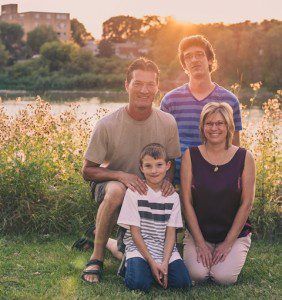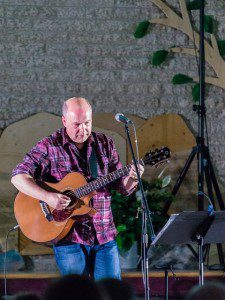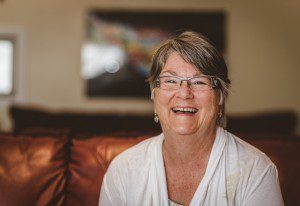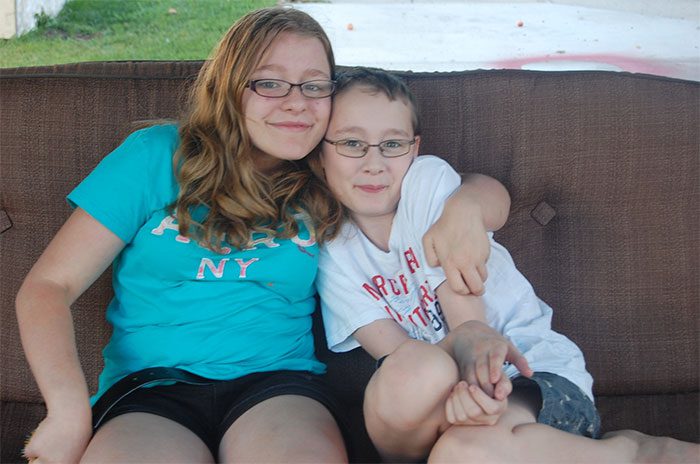Including people with disabilities in the church
“We’d just learned our unborn child has Down syndrome. As we walked into a new church, a man with Down’s welcomed us warmly and led us to the visitor centre. God used this greeter to tell us everything we needed to know.”
One in seven Canadians has a disability, and one in 50 children is diagnosed with autism alone: individuals and caregivers need support. Parents and leaders learned about fostering inclusion in the church and shared their personal stories of hits and misses at Hope Centre Ministries’ “IN” conference in Winnipeg, April 2013.
Evan
When Karis and her husband came to the adoption question “Would you consider a child with disabilities?” they checked “Yes.” Then they got pregnant. “God saw it was in our hearts.
Reynold and I feel God has chosen us to be Evan’s parents, a task we couldn’t do without him.”
A lot goes into getting their 10-year-old son Evan, who has autism, ready for services at McIvor Avenue MB Church. Karis consults the Sunday school teacher and church calendar so she can talk through the morning’s events with Evan ahead of time; she packs a book, fidget toy, and snack. Following along in the bulletin helps: Evan finds it comforting to know what’s coming next.
But he sometimes talks or giggles during the sermon, and has a meltdown when asked to be quiet. When Karis takes him out, he screams, “But I want to see Jesus!” If they were Pentecostals, she laughs, he’d fit right in!
More must be done to affirm parents, she says. “I’m weeping in the foyer because we’ve had to leave the service,” and as people walk past, Karis’s wish is for “just a touch.” “If Jesus were walking around today, he would be waiting at those front doors, asking what he could do to make it easier for us and for Evan,” says Karis. Without the support of “an amazing women’s ministry group who have laughed and cried with me over Evan, I would feel alone and unconnected.”
Numerous volunteers have acted like Jesus by staying with Evan during Sunday school, freeing Karis and Reynold to attend an adult class or enjoy a coffee. One volunteer experienced with autism taught the Sunday school teachers how to adapt for Evan.
Her wish for Evan is that “he will grow up in the church to feel included, needed, cared for, accepted, encouraged, understood, and loved.” People often quip, “God doesn’t give you more than you can handle,” but Karis says, “God gave us more than we could handle because he wants us to rely on him” – and his church.
Kiana & Malachi
“Church is where you should be safe, but you’re not always – because we’re all human,” says Mona Scott, who has two teenagers with autism. “Kiana has come home crying, ‘If I weren’t so weird, people would like me.’” For Malachi, the noise and crowds at North Kildonan MB Church can be overwhelming. Mona and Malachi often watch the service on a TV in the foyer.
Despite the ongoing challenges, Mona is grateful for people at church who help Kiana and Malachi feel like they belong. Sunday mornings, Malachi runs at youth leader Ben Harapiak for a hug. When Mona posts about a bad day on Facebook, Ben texts her to see how things are going. And since Kiana can’t tolerate the noise of the Bomber games, a family friend (a diehard Bomber fan like Kiana) takes her to watch the football team practise.
“That’s what inclusion looks like: people taking an interest and wanting to know my kids for who they are!” says Mona.
Mona says it’s urgent that churches find “a different way” to reach all learning styles. “Give my kids a Bible and ask them to read along, and they’ll become ‘distracting,’” but “put it to music, and you’ve got them hooked!” Kiana has been impressing judges at vocal competitions since she was 4 and plans to join a worship team. “With autism, once they get it, they put their heart and soul into it.”
Kiana doesn’t understand theology and can’t memorize Scripture, but the first person she turns to is God. “I used to think Kiana was just talking to herself, and then I stopped and listened: wow, 80 percent of the time she’s talking, she’s praying!”
Donovan

Donovan Thiessen and Jeannette Thiessen
Photo: Tony Schellenberg
“What meant a lot to me, when we came into McIvor Avenue MB Church for the first time, was seeing a banner of the world with people holding hands – and one had a wheelchair,” says Jeannette Thiessen.
In Africa, her son Donovan, who was born with an unlisted genetic disorder, was included by the small group of missionary kids. When Donovan’s cancer (which put him in a wheelchair), forced the family to return to Canada for treatment, “people would say hi to us and our other kids, but not always to Donovan. It was as though he didn’t exist.”
Despite youth pastor Denver Wilson’s best efforts, “Donovan stayed on periphery [at youth events]. If youth group is going to work, kids with special needs need one-to-one mentoring.”
“The piece that’s missing in many of our churches is awareness” from the front, says Jeannette. She applauds the pastor in a story IN speaker Barbara Neuman told: when a girl screamed during his message, he said, “I’d like to introduce you to a new family. Their daughter is sensitive to noises and the seams in her clothes, and sometimes gets so uncomfortable that she has to say something.” The next time the girl screamed, no one stared.
Before Donovan attended Serve (a weeklong service opportunity for people with disabilities, similar to MB Mission’s SOAR), Hope Centre asked Denver to commission Donovan. “After the commissioning service, so many people came to talk to Donovan!” says Jeannette.
Donovan – now 29, in remission from cancer, walking again, living on his own, and driving himself to his full-time janitorial job – has his own story to share: when he had cancer, he heard Jesus say, “I’m not taking you to heaven now. I have you here for a purpose.” Part of that purpose is serving as an usher at McIvor; another is paving the way for others with special needs.
Jeannette and her husband Elmer “hope to create a safe place in our home for families” – not a “sob fest,” but a support group to talk about where God is, and how he sees their children, and to make a game plan for school, respite, employment, housing – and next steps. For example, “If the child qualified for funding, they can stay in school till age 21, but then what?”
Justin

Michaud Family
Photo: Tony Schellenberg
Lucie Michaud’s 20-year-old son Justin can build a gazebo, so when he struggles with everyday tasks and decisions, some assume he’s lazy. “People thought I was just a bad parent,” says Lucie. Justin was diagnosed with an autism spectrum disorder at 17.
With growing independence, and without the structure of adapted high school, six-foot-six Justin’s behaviour became more challenging. Once, Lucie had to leave work because Justin felt ill, panicked, and called an ambulance. He was refused provincial housing, employment, and support services because his IQ is too high in some quadrants – even though his adaptability skills meet criteria. One organization denied the family support because Justin hasn’t been in trouble with the law.
Exhausted, Lucie’s husband Mitch stepped down from the volunteer worship leader position he’d held at Église Communautaire de la Rivière Rouge (ECRR) for 11 years. Church friends ask how they can support them, but Lucie says she’s too tired to come up with lists, and it’s awkward to say, “Please clean my house, take my son for a hamburger, take him to Home Depot.” She recommends people help however they’re gifted, and tears up as she recalls a friend who dropped off a homemade meal.
For the past year, Justin’s had a “God-given” boss who drives him to work and makes sure he has lunch, and Lucie acts as Justin’s social worker, taking him grocery shopping and checking his finances. Until their building was sold, ECRR rented Justin living space in the church. Now, he’s in an apartment five minutes from Lucie and Mitch.
Lucie takes Isaiah 42:6 (“I will take hold of your hand”) as a personal promise. “God allowed us to go through this journey, so we can say, ‘This is how this affects my child, our family, and church life.’ I feel like God wants to do something new by making people aware.”
“People want to give me solutions and Scriptures. I know God is there, but my heart is hurting,” says Lucie. “Would you cry with me? Please love me and love my child.”
Benjamin & Isaiah

Brian Doerksen
Photo: Tony Schellenberg
Worship singer/songwriter Brian Doerksen took the stage at Hope Centre’s conference, not as a performer, but as a father. When Brian’s third child was three, Benjamin was diagnosed with Fragile X Syndrome, a genetic condition causing a range of developmental delays. Brian and Joyce’s future children had a 50/50 chance of having it.
“There’s a season where it settles into your soul. Then you realize: it means the rest of my life,” says Brian.
September 1998, Brian felt a stirring: “Take a risk, now that you have all the genetic data, and have another child.” People angrily ask, “Why?” He has two reasons: to model to his daughters, who are carriers, to take the risk. And second: “We believed we’d have a child without Fragile X.”
During Joyce’s pregnancy, Brian composed these lyrics, amid overwhelming fear: “I don’t know what tomorrow holds. Still I know I can trust your faithfulness.”
“What people fasted and prayed with us for didn’t happen,” says Brian.
He considered giving up his ministry to help raise two special needs sons, but “I sensed God wants me to keep going – a little more broken, a little more trusting.… A little later, I had the picture of Joshua asking the people to choose, and the phrase ‘As for me and my house’ (Joshua 24:15). You don’t choose your household; you take what God gives.”
Isaiah, now 13, is a living love message from God. “When he wakes he’s on a single mission: to hug as many people as possible,” says Brian. Everywhere they go, Brian’s family of eight has to think WWID: “What would Isaiah do?” Will there be food that fits his dietary restrictions? Will there be sounds that overwhelm him?
Brian doesn’t set out to write worship hits; these are his own “survival songs.” Even though his “Come, Now is the Time to Worship” and “Faithful One” are heard around the world, like other parents of children with disabilities, Brian’s heart’s cry is that the church would “truly see my children.”
A pastor responds

Mary Reimer
Photo: Tony Schellenberg
“I was overwhelmed and felt the need to apologize on behalf of the church,” says FaithWorks pastor Mary Reimer about hearing parents’ roundtable stories at IN. “I saw how poorly equipped the churches are to enter their situation.”
“I can’t imagine what it’s like for parents to navigate the turbulent water of disapproval with their kids,” she says. “We have no desire to hurt or be exclusive. We do it out of fear; rather than get it wrong, we do nothing, which hurts more than anything.”
“People tend to back away from disruptive behaviour, and label the child as a nuisance instead of getting information,” says Mary. She latched onto a tip from Neuman’s G.L.U.E. Training Manual workshop: rather than asking, “Does your child have ADHD?” ask, “Does your child have difficulties with reading, using scissors, staying focused?” Then visit each family and discuss how to make the child more successful and safe.
The church must create a safe place for conversation. Mary understands parents’ desire not to label their child, but when they’re silent about their child’s needs, “it leaves untrained volunteers to figure it out for themselves, and by that time, it’s beyond them and they’ve quit.”
At FaithWorks’ Mother’s Day service, using one of Neuman’s activities, Mary distributed two-coloured puzzle pieces, asking everyone to write their strengths on one colour and weaknesses on the other, to reinforce that “we are all both sides.” The person whose weaknesses irritate us may be exactly the one God wants to use to shape us.
“I believe the most important attribute we have is that we’re loved by God,” says Mary. “And that’s one we all share.”
For more on this check out Northview Community Church’s Imagine
What you can do:
√ Speak positively about everyone, whether it’s your own child, your student, or the person in the next pew.
√ Listen without giving advice.
√ Bring a family dinner. It doesn’t have to be a full-course meal; even a delivery pizza tastes like love.
√ Invite someone with disabilities to come with you to their favourite shop, restaurant, or sports game.
√ Use visuals in your class or service for people who have difficulty hearing, reading, processing, or sitting still. This could be as simple as printing the order of service and Scripture in the bulletin, or take more investment like performing dramas on stage.
√ Help families form a support group. Offer space, promotion, material, budget, and encouragement.
√ Create a culture that accepts outbursts of joy or pain.
√ Have a toolbox of fidget toys (such as stress balls) available in classrooms and sanctuary.
√ Appoint an inclusion coordinator for your church who is not a caregiver of a person with disabilities. This individual isn’t responsible for providing the hands-on support but ensuring no one falls through the cracks.
√ Welcome families to speak from the pulpit, at a membership meeting, or in a Sunday school session about their diagnosis. Or invite a ministry like Hope Centre to do a needs evaluation or presentation in your church. [See what Northview has done]
√ Create a form for Sunday school students that focuses on needs and strengths, rather than labels: What does she like to do? How does she learn best?
√ Assign a mentor to each person with disabilities in your youth or Bible study to help them feel welcome.
√ Teach the puzzle piece lesson. (www.clcnetwork.org/clc-store/church-services/inclusion-kits)
√ Train a support team for each family with a disability to coordinate respite, advocacy, rides, meals, and prayer. If the individual has dementia, teach the team the names of everyone in the family photos, so they can talk about them.
√ Support a housing project for adults with disabilities.
√ Furnish your church with ramps and audio receiver systems. Include artwork of and by people with disabilities.
√ Put your hand on the shoulder of a parent who’s helping a frustrated child. Let them know you care.
√ Recognize each person’s gifts and seek to use them. For example, someone who can’t see faces might see straight into the heart and make a life-changing mentor.
Overheard
A Special Olympics athlete told me, “Your son is going to be a strong man; he’s stubborn, but it will help him later.”—Karis
I had an epidural, so I blamed myself for Donovan’s struggles, worrying he hadn’t gotten enough oxygen.—Jeannette
I have a saying on my fridge: We know God wants his best for us; we just don’t know how difficult his best will be.—Mona
Our African friends knew how to suffer together because everyone had lost someone. They knew how to sit and be quiet.—Jeannette
Treat us as equals. The world looks at people with disabilities strangely, or looks down on us. I wish the world could say we’re people.—Donovan


3 comments
I read this article, and was deeply touched. I know several of the people in it – and thank God for their honestly, authenticity and vulnerability.
I smiled when I read what Karis said about taking her son out of the service with him yelling that he just wanted to see Jesus.
I think that if we take the time, to really look – and to treat those with disabilities as people (as Donovan hopes that people will do) then we will see Jesus in a very real way through each and every person with disabilities.
I am touched when I watch a young man with disabilities worship unabashedly… or when I see him serve communion.
We have a long way to go – but I am thankful families like those in the article can help us understand, and hopefully become more inclusive!! And may we all bless one another in the process!!
I totally agree with Joy. It’s exciting to see what Willingdon and Northview are doing with disabled kids. It would be interesting to know if any church has a class for adults with disabilities.
I find these stories really touching